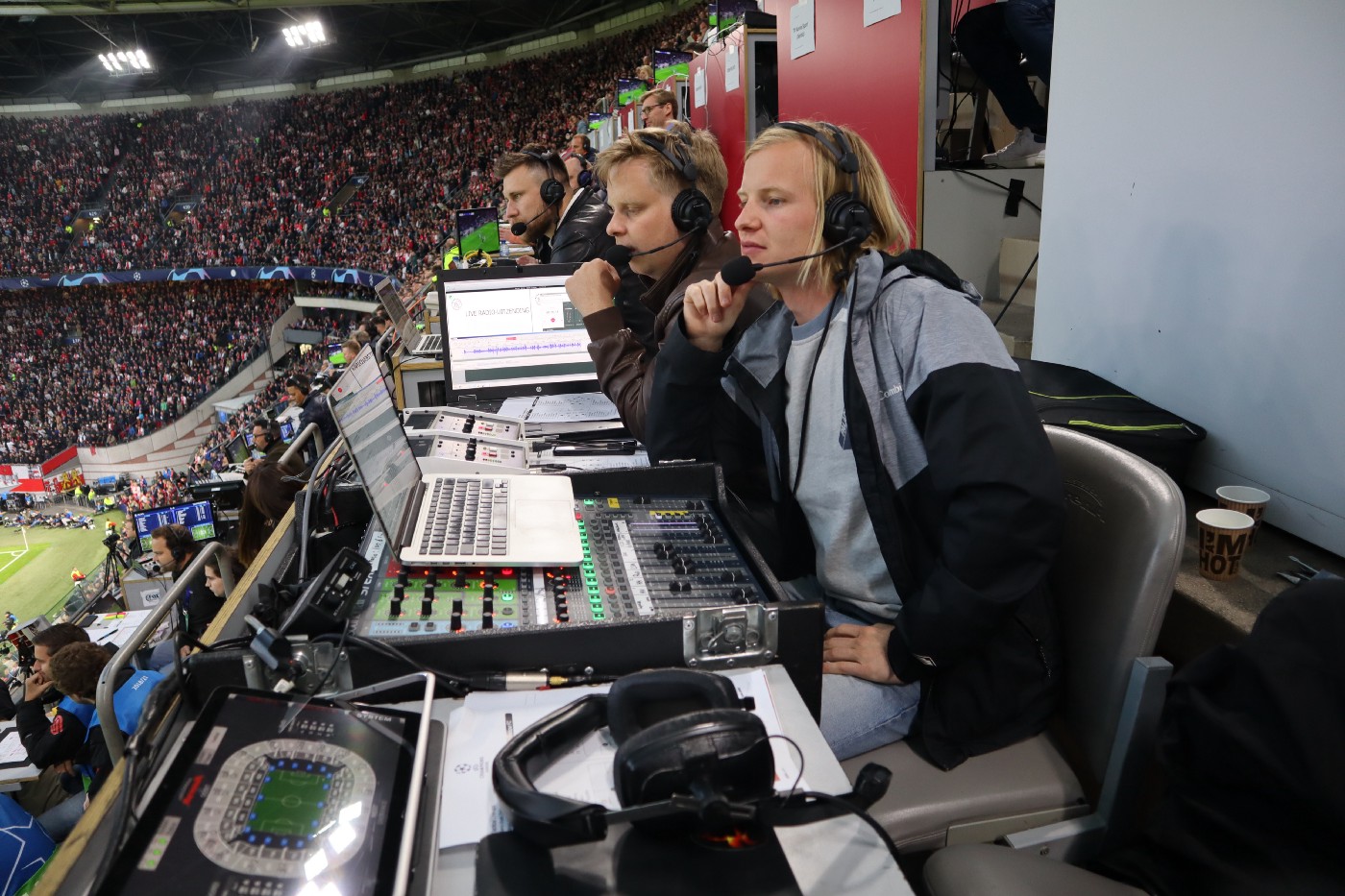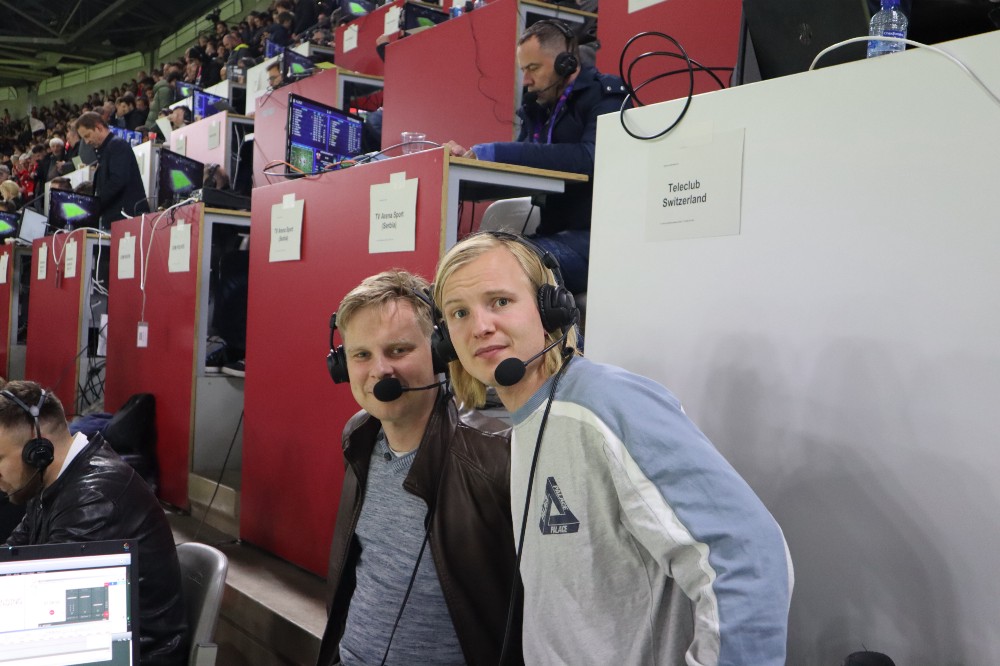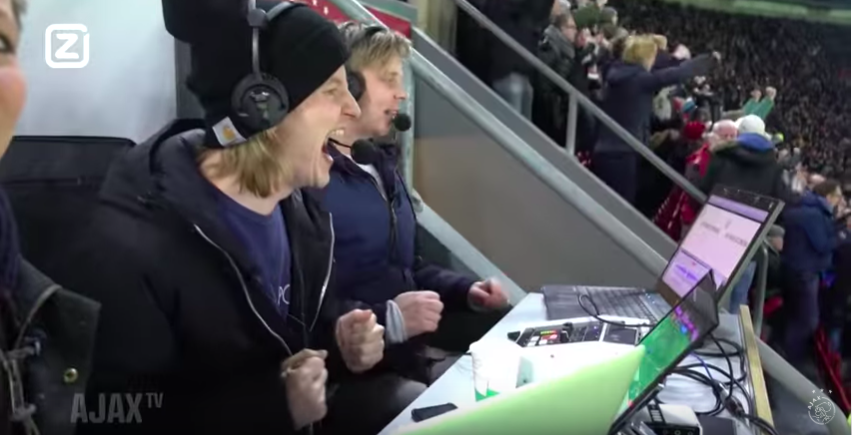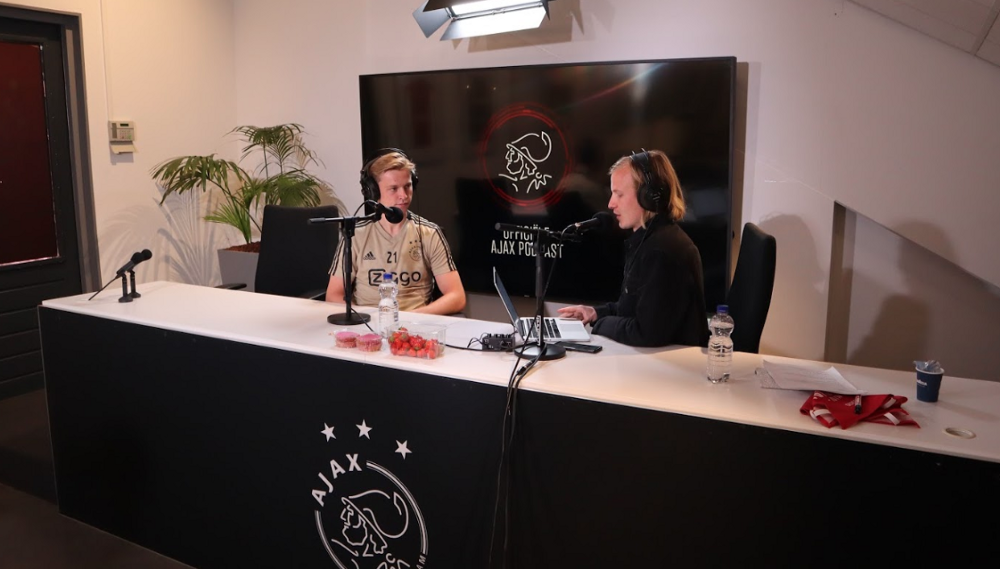
Diederik van Zessen co-hosts Ajax Radio, the official radio broadcast for Amsterdamsche Football Club Ajax (AFC Ajax).
He chats to Mixlr and shares a couple of trusted tips for co-hosting, muses on how live audio is an antidote to ‘FOMO’ and describes what it takes to become ‘the eyes’ of the listeners.
What prompted your start in sports commentary?
I was studying journalism at university when AFC Ajax — my favourite football club — was looking for radio commentators. They were piloting a session for the visually impaired by broadcasting the game live within the stadium. This was (and is) funded by the club’s accessibility foundation to make the games inclusive for everyone.*
I started as backup, learning from the more experienced guys. Now (10 to 11 years later), my co-host Anne de Jong and I broadcast for Ajax Radio.
*Ajax’s home stadium reserves an area for the hard of hearing, where seats come with listening devices for live radio commentary.
We might celebrate and we yell, but we try to immediately say how the goal went in. And we try to repeat it a few times.
Do you find there’s a difference in broadcasting for the visually impaired?
We might broadcast differently compared to other sports broadcasts. We have to constantly say how far the goal is from the penalty area (for example, 5m away), or whether someone has a new haircut.
If we’re describing the ball as headed towards the platform, the attendees can move away from its direction, if needed. Essentially, the commentary helps them react to the game if they can’t see. So, we have to be super observant and point out the minute details — we’re the eyes of our listeners. We also get a lot of positive feedback about these extra details from listeners that aren’t in the stadium.
We might celebrate and we yell, but we try to immediately say how the goal went in. And we try to repeat it a few times. If the crowd is going wild, people might not have heard what happened, so we have to elaborate further after the goal’s been scored.
I practice at home by commentating on football matches on TV — it’s very annoying for my partner.
There’s a lot of historical radio clips of the 1998 World Cup in which a radio host goes completely nuts because the Dutch team scored. For me as a commentator, it’s very funny because the minute the goal is scored, all you hear is “Bergkamp! Bergkamp! Bergkaaaaamp! Bergkaaaamp!” but, if you’re not watching, you have no clue which corner he shot it from, which corner it went into, or whether the keeper should have saved it, because you’re relying on the broadcaster reporting.
How do you train yourself to keep your emotions in check for intense games?
Describing everything in great detail can be really hard. You have to train yourself by doing it a lot of times. I practice at home by commentating on football matches on TV — it’s very annoying for my partner.
Last year was difficult because it was a great, great year for Ajax. I plead guilty for sometimes not being completely on point. We didn’t broadcast the away matches so when Ajax beat Juventus and Real Madrid at the UEFA Champions League, I was in the audience. But when Ajax played Tottenham in the semi-finals (at Ajax), it didn’t end well and we didn’t say a word for seven seconds. Indeed, we didn’t do our work very well. We were very struck by the late goal…it was so sad.
But, no one ever expected Ajax, or any Dutch club for that matter, to get into the semi-finals so we enjoyed it.

You’ve witnessed so much through Ajax Radio since you joined. What’s evolved? What’s stayed the same?
At first it was an analogue broadcast — that was 11 years ago — then Ajax Radio expanded to digital through its own app and then via Mixlr later on. When we would broadcast live on away days, Ajax Radio was the way to follow the club.
Yet, our core audience — including the fans that react via social media and everything — are still the visually impaired. This never changes.
What was your first-ever broadcast like, and what do you wish you had known then?

Synonyms. When I started, I didn’t have that many synonyms for football moves. I still have a recording of that broadcast, and I only used the word “pass” (it’s the same word in Dutch), so there was a lot of: “he passes it to…and then he passes it to…and then he passes…” Now, I make use of synonyms. “He hands it over…shoves it…” etc.
What are some other tips you can share for budding commentators?
If you can, be subjective. Be a fan because people love it.
When it comes to co-hosting, we follow a bunch of classic radio rules such as talking for an average 50 seconds, then your co-host takes their turn. Anne and I have been working together for 10 years, and if I were to check it now, we’re still on average, at 50 seconds each. It’s an old rule but works like a charm.
We also often get asked “How do you know the other one is ready?” It’s an old radio trick, too. If your co-host is sitting back against their chair, they’re not ready. If they sit up, it means they want to say something, and you can give it away to your co-host.
I would say that describing scenes — being someone’s eyes, so to speak — is the most challenging way of creating content for audio broadcasts. This is also the future of radio.
You also worked as a broadcaster outside of sports. How would you compare the two?
In the early days I worked for an alternative music radio station called Kink FM. It was completely different from sports commentating. I only had to talk for one to two minutes an hour: “Hey…it’s the Arctic Monkeys playing… How are you doing… This is Oasis…” I was also the music director at NP0 3FM (equivalent to BBC Radio 1 in the Netherlands) but left to pursue more innovative areas. Personally, I would say that describing scenes — being someone’s eyes so to speak — is the most challenging way of creating content for audio broadcasts. This is also the future of radio, otherwise you can just put a Spotify playlist on or something.
So, from your perspective, what makes live audio worthwhile?
FOMO (the Fear Of Missing Out) — it totally touches the point of FOMO, doesn’t it? Especially with football games.
I think for atmospheric reasons, following the game on the radio is the best way to feel like you’re there at the game — you can hear the noises of the stadium, you can feel the vibe. Especially because we’re also Ajax fans, there’s more of a vibrant appeal listening to Ajax Radio than a neutral TV recap or broadcast (they’re way more static).
You’re a big fan of podcasts. How do you think live audio can elevate podcasting?

There’s a lot of popular podcasts consisting of two to four people discussing a niche topic, with a jingle intro and a jingle in between that could easily be broadcast live, creating the possibility for listeners to interact immediately. And you’d still be able to upload it later as a podcast.
After every home match we also record the Ajax podcast and usually have a player or a famous person as a guest. A few days before, we reach out to fans on Twitter or Instagram asking if they have any questions for this guest. I’d like it way more if listeners could communicate live with us, but we have to adhere to a few club restrictions for edits.
Listen to Ajax Radio’s live matches here or download the weekly podcast, where you can catch Diederik and his co-host Anne with special guests.
